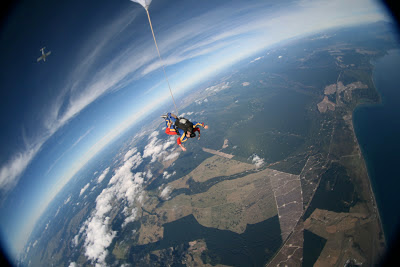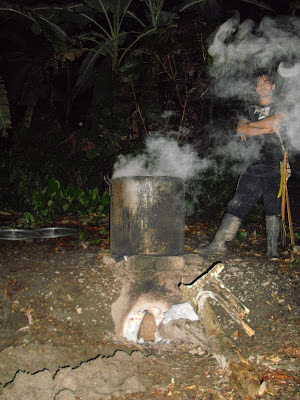Most of us identify with somewhere, a place we call home. And while we tend to have a strong sentimental attachment to where we were born as well as the family we belong to, we, of course, had no say in either case.
However, whether we like it or not, our place of birth is an important decoder for many people as to what we’re about, our view of the world and suchlike.
However, whether we like it or not, our place of birth is an important decoder for many people as to what we’re about, our view of the world and suchlike.
Moreover, because we tend to be only ever seen as being from one place regardless of how well travelled we are, if we settle in another location for a time our views and opinions on certain things are often not considered as important compared to those of the "natives".
One of the more innocent ways this can manifest itself is in the ‘what would you know, you’re not from here’ jibe from locals.
One of the more innocent ways this can manifest itself is in the ‘what would you know, you’re not from here’ jibe from locals.
In a Colombian context, normally that statement of fact doesn’t bug us – appearances apart, our general honesty tends to mark us out as different.
But if it’s said in a mind-your-own-business context when the discussion is centred on areas where perhaps this country could do better – environmental, social and other such borderless issues in a sense – then we can get quite animated.
You see, despite how small the world may have become thanks to advancements in technology as well as travel, we human beings are still quite tribal.
In some ways, this tribalism can be positive and even enjoyable.
 |
| Not much time left to save ourselves. Or is the game already up? |
In some ways, this tribalism can be positive and even enjoyable.
Sport, for one, in its truest form – a bit of healthy competition where clubs or regions or nations or whatever go head to head to see who is the best within a certain sphere. Heck, we could even put the Eurovision Song Contest into this positive (although, perhaps not enjoyable) tribalism.
But even within the sport bubble, the more insidious elements of this particular ‘ism’ frequently surface. Hatred of the ‘others’, racism, violence – the world’s soccer terraces and indeed playing fields are particularly adept at fostering such feelings and subsequent actions.
It is within the fields of both nationalism – or land ownership in its earlier form – and religion, though, where tribalism has been at its most brutal and deadly.
But even within the sport bubble, the more insidious elements of this particular ‘ism’ frequently surface. Hatred of the ‘others’, racism, violence – the world’s soccer terraces and indeed playing fields are particularly adept at fostering such feelings and subsequent actions.
It is within the fields of both nationalism – or land ownership in its earlier form – and religion, though, where tribalism has been at its most brutal and deadly.
From man’s earliest battles to the world’s current conflicts these two afflictions have been to the forefront.
Considering the origins of the human race, perhaps it should come as no surprise that the Middle East continues to be the global epicentre of these wars. We may live in a more "advanced" age than ever before, dealing on a daily basis with people who are not of our tribe, but old habits die hard.
To deal with the problems we face – be they economic, environmental, health, etc. – most of us now realise that cooperation and close partnership on a global scale is what is needed.
 |
| 'Thou shalt not cross' - Orangemen about to march in Belfast. |
What’s more, as a species we have done more to damage our natural environment than any other, something, again the majority of us are finally aware of.
Yet despite a lot of talk about trying to limit our destructive ways, progress on this front appears to be painstakingly slow.
In times of uncertainty or danger, we tend to retract into the comfort of our tribe. Again, we may outwardly know that we’re all interconnected but a lot of the time our actions betray that.
Take the current EU economic crisis. Now, while many wrongs have been made by many parties across the currency "union" – in both the euro’s formation and its operation – the best, indeed only, way to solve the problems is through greater alliances and collaboration.
In times of uncertainty or danger, we tend to retract into the comfort of our tribe. Again, we may outwardly know that we’re all interconnected but a lot of the time our actions betray that.
Take the current EU economic crisis. Now, while many wrongs have been made by many parties across the currency "union" – in both the euro’s formation and its operation – the best, indeed only, way to solve the problems is through greater alliances and collaboration.
The desire in a number of quarters, however, is to go on solo runs, to withdraw to the national boundaries that we know and love so well. Europe doesn’t need reminding of the problems that can emerge when jingoistic tendencies spring up.
From time immemorial, powerful political and religious leaders have been able to mobilise the masses under their control to fight for a relatively abstract state or belief in order to butcher their fellow man. For in individual terms, a few psychopaths aside, most human beings do not have an inherent desire to kill.
From time immemorial, powerful political and religious leaders have been able to mobilise the masses under their control to fight for a relatively abstract state or belief in order to butcher their fellow man. For in individual terms, a few psychopaths aside, most human beings do not have an inherent desire to kill.
However, throw in a perceived dehumanised, monstrous enemy, with associated misplaced fear and ignorance and it’s surprising how that can change.
Modern warfare, where thousands of people can be killed at the touch of a button in an off-hand way, has balanced out any developments we may have made in the last few hundred years to be a more enlightened, peace-seeking species. The lives lost don’t seem real, the damage and pain is very often removed from the doers' sight.
Two, seemingly paradoxical, mindset changes are needed. One is to step outside our small tribal base and think of the global, inter-dependent, inter-connected tribe as well as this planet being our shared home.
Modern warfare, where thousands of people can be killed at the touch of a button in an off-hand way, has balanced out any developments we may have made in the last few hundred years to be a more enlightened, peace-seeking species. The lives lost don’t seem real, the damage and pain is very often removed from the doers' sight.
 |
| Time for us to change our view of the world. |
The second is to think of those others, fellow people that is, as individuals – living, breathing beings with similar worries, concerns and aspirations as ourselves.
The usual argument against all this is that it’s wishy-washy, idealistic, utopian rubbish.
The usual argument against all this is that it’s wishy-washy, idealistic, utopian rubbish.
Yes, it is idealistic, but what's wrong with having lofty aspirations? The easiest option is to just accept things as they are. Make no attempt and, of course, nothing will change. For some, that is perhaps the way they want it.
But for the human race to truly evolve it demands more. As does the quest to protect our shared global home.
___________________________
* For related articles see: 'Phantom freedom' http://bit.ly/SOQUl0 and 'Whose land is it anyway?' http://bit.ly/NQIsTr
But for the human race to truly evolve it demands more. As does the quest to protect our shared global home.
___________________________
* For related articles see: 'Phantom freedom' http://bit.ly/SOQUl0 and 'Whose land is it anyway?' http://bit.ly/NQIsTr





